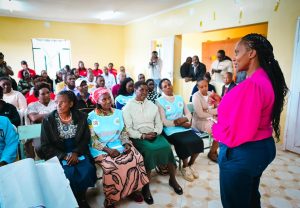The government, in partnership with Kenya Red Cross Society, has kicked off the training of more than 100 community health promoters (CHPs) in Laikipia aimed at boosting efficient health service delivery in the county at the grassroots level.
Principal Secretary for Public Health and Professional Standards Muthoni Muriuki, speaking in Nanyuki on Wednesday during the 10-day training, noted that the CHPs would ensure that the 161,000 households in Laikipia were registered in the Social Health Authority.

“Laikipia has a population of 161,000 households, and we want to ensure they are all registered into the Social Health Authority since it’s important for everyone to be part of this system (SHA),” said the PS.
She highlighted that CHPs played a critical role in the registration of people to the new health system and hence needed to support them.
The PS at the same time encouraged residents to get enrolled in the SHA initiative to enable them to access medical services without challenges, revealing that no patient would be turned away from any health facility as the government continued to streamline the health fund sector.
“I have seen in the media people saying that they have not received services, and we are asking all the facilities not to deny anybody treatment; if there are issues that need to be sorted out, let them not drag any patient into that issue,” warned the PS.
Additionally, she pointed out that the SHA had more benefits as compared to the defunct National Health Insurance Fund since it covered emergency chronic and critical illnesses, among other benefits, for instance, Linda Mama, which she said had been enhanced.
“SHA is bigger and better; there are more benefits than there were in the NHIF. It covers three funds: the primary health care, social health insurance fund, and emergency chronic and critical fund,” noted the PS.
Peter Kamau, a Nanyuki-based community health promoter since 2011, noted that the community health had improved through their services, which included referring patients to hospitals and monitoring pregnant women until their due dates.
“We have registered a lot of people at the household level, and the government has facilitated us, including the provision of phones, which we use to collect data for submission to the health ministry dashboard,” noted Kamau.
He further said that their work entailed health promotion and prevention care at the grassroot level to ensure a community free of ailments.
By Muturi Mwangi





